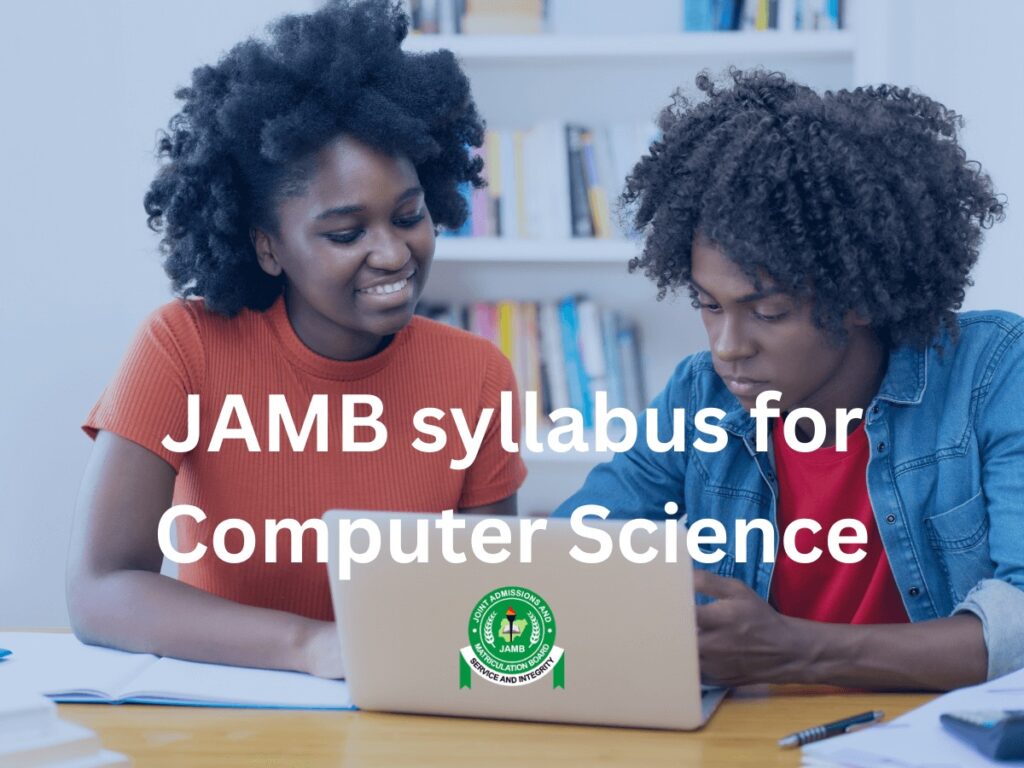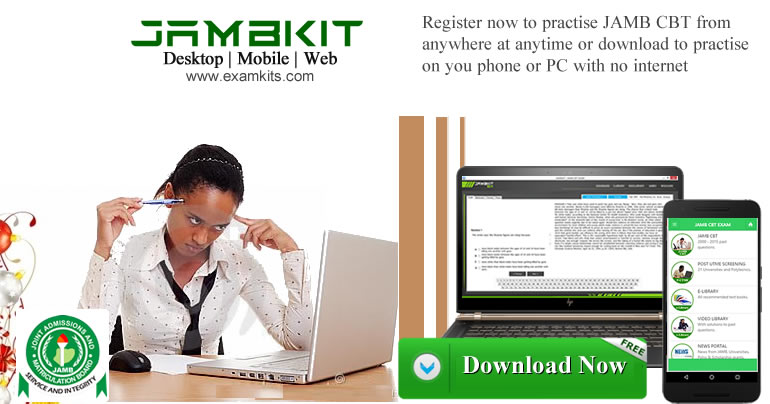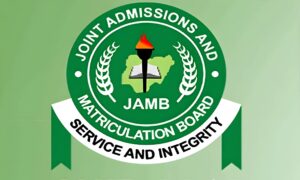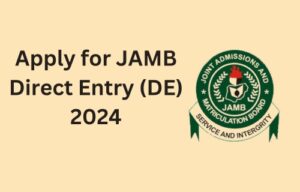JAMB Syllabus for Computer Studies 2024/2025

The JAMB syllabus for Computer Studies 2024/2025 has been uploaded. The Joint Admission and Matriculation Board made this move to help students prepare for their forthcoming UTME.
Objectives of JAMB Syllabus for Computer Studies
The JAMB syllabus Computer Studies aims to prepare the candidates for the Board’s examination and to test candidates’ understanding, knowledge, and acquisition of the following areas of the subject:
- Evolution of Computing Systems
- Basic concepts of computer and its operations
- Problem-solving skills, data processing, and practical skills in Computing
- System software and Application Software.
- Operations of Basic computer hardware – Input, Output, Memory, and Central Processing Unit
- Application of Online resources and Online skills
- Ethics and Human Issues in Computing
- Career Prospects in Computing
Topics Under JAMB Computer Studies Syllabus
The topics in the JAMB syllabus for Computer studies are divided into nine sections.
Evolution of Computing
With the Evolution of Computing, the JAMB syllabus covers the following topics:
History Of Computing
- Pre-Computing Age: 19th-century (Features and components of early computing devices)
- Computing Devices (20th Century)
- The History of The Various Devices
Classification Of Computing Devices
- Classification according to Generation
- Classification according to Size
- Classification according to Purpose
- Classification according to Type

Start practicing for the forthcoming JAMB CBT exam with JAMBKIT, which contains Jamb 2000 to 2023 past questions, Post UTME past questions from 21 universities and polytechnics, Video solution to all Jamb questions, Brochure and Syllabus, E-library, Games and Much more
Fundamentals of Computing
With the Fundamentals of Computing, the JAMB syllabus covers the following topics:
Advertising
Overview of Computing Systems
- Constituents of a Computer: Software and Hardware
- Characteristics of Computer Devices
- Type, Examples, and Uses of Computer Hardware Devices
- Logic Circuits
- Types, Examples, and Uses of Software
Data and Information
- Differences between Data and Information
- Data Representation.
- Methods of Digitization
Computer Application Packages
With the Computer Application Packages, the JAMB syllabus covers the following topics:
Word Processing Package
- General Concept
- Creating and Saving Documents
- Editing, Formatting, and Insertion
- Printing
- MS Word (Features, How to Launch MS Word, MS Word Basic Operations, and other Operations)
Spreadsheet Package
- General Concept
- Creating and Saving Documents
- Editing, Formatting, and Insertion
- Printing
- MS Excel (Features, How to Launch MS Excel, MS Excel Basic operations, and other Operations)
Database Package
- Definition of Database and Common Examples of Database Packages
- Database Organizations
- Different Features of Database Format
- Basic Operations of Database using MS Access
- Create a Database using MS Access
- Operations to carry out an existing Database using MS Access.
Graphic Package
- Definitions and Examples of Graphic Packages
- Features of CorelDraw
- Simple Designs using CorelDraw
Presentation Package
- Definition of Presentation package and examples of Presentation packages
- PowerPoint (Features, Activation of an existing PowerPoint Presentation, PowerPoint Operations)
Web Design Package
- Definition and Examples of Web Design Packages
- Uses of Web Design Packages
- Elements of Web Design using Dreamview
Managing Computer Files
With the Managing of Computing, the JAMB syllabus covers the following topics:
Concept of Computer Files
- Definitions of Basic terms
- File Organisation Systems
- Methods of Accessing Files
- Classification of Files
- Criteria used in Classifying Files
Handling Computer Files
- Basic Operations of Handling Files
- Data Loss
- Security of Computer Files
- Computer versus Manual files
Computer Maintenance and Safety Measures
With the Computer Maintenance and Safety Measures, the JAMB syllabus covers the following topics:
Booting and Shutting Down Process
- Definition of Computer booting
- Types of Computing Booting processes: Cold and Warm booting processes.
- Differences between Warm and Cold booting processes
- Guidelines on booting and shutting down Computer systems
Computer Maintenance
- General procedures for cleaning a computer system
- How to charge and replace batteries for portable systems and UPS
- How to Clean Drive Lens
- Simple Maintenance of Hardware and Software system
- How to Retrieve data from a crashed System
Computer Room Management
- Definition of a Proper Sitting Arrangement
- How to correctly position monitors, keyboards, CPUs, and other peripheral devices
- Proper illumination of a computer room
- How to maintain a dust-free environment in the computer room.
- Rules and Regulations in a Computer Laboratory
Information & Communication Technology (ICT)
With the Information and Communication Technology, the JAMB syllabus covers the following topics:
Advertising
Communication Systems
- Definition and Meaning of the Acromyn ICT
- Types and Examples of ICT
Application areas of ICT
- Areas where ICT is applied
- ICT-based Devices
Internet
- Definition of terms
- Internet Browser Applications
- Features of Internet Browser Applications
- Internet Services
Electronic Mail
- Definition
- Service providers of Electronic mail
- Steps to create and open a mail (how to chat)
- Features of an email address
Networking
- Meaning of Networking
- Types of Networking
- Topologies of Computer Networks
- Devices Used in Computer Networks
World Wide Web (WWW)
- Definition and Meaning of the Acronym WWW
- History of WWW
- Basic terminologies
- Protocol
- Advantages and Disadvantages
- How to Navigation through Websites
- Software used in Web Development
- Differences between an email and a website
Cables and Connectors
- Network cables and connectors
- Computer cables and connectors
Developing Problem-Solving Skills
With DevelopIng Problem-Solving Skills, the JAMB syllabus covers the following topics:
Programming Language (PL)
- Definition of PL
- Classification of Programming Languages
- Advantages and disadvantages of different types of PL
High-Level Languages (HLL)
- Classifications of High-Level Languages
- Characteristics of HLL
- Translators (Definition, Classifications, and Uses of Translators)
Algorithm and Flowcharts
- Definitions
- Functions of Algorithm and Flowcharts
- Properties of Algorithm
- Symbols used in Flowcharts
Programming Language Structure
- Basic Statements Used in Programming Language Structure
- Arithmetic/string operators
- Subunits
- Primitive and non-primitive data
Program Development
- Definition
- Characteristics of programs
- Precautions
- Guidelines for developing a computer program
System Development Life Cycle (SDLC)
- Definition of System Development Life Cycle
- Various stages of SDLC
Artificial Intelligence (AI) and Robotics
With Artificial Intelligence (AI) and Robotics, the JAMB syllabus covers the following topics:
Artificial Intelligence (AI)
- Definition of Artificial Intelligence
- Branches of AI
- Applications of AI
Fundamentals of Robotics
- Definition of Robotics
- Main Components of Robotics
- Types of Robots
- Application Areas of Robotics
- Advantages and Disadvantages of Robots
Computer Ethics and Human Issues
With Computer Ethics and Human Issues, the JAMB syllabus covers the following topics:
Computer Ethics and Human Issues
- Ethical issues
- Computer Security
- Cyber risks and protection
- Computer-related crime
- Responsibility for computer failure
- Protection of computer property, records, and software
- Privacy of the company, workers, and customers
Read, also: JAMB NOVEL 2024/2025:SUMMARY OF “THE LIFE CHANGER”







